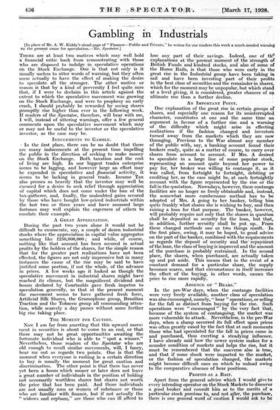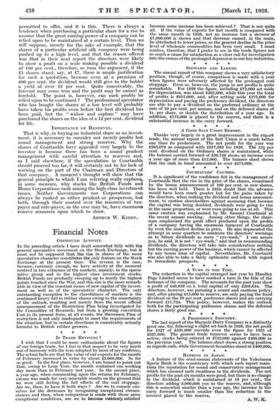Gambling in Industrials
[In place of Mr. A. W. Kiddy's usual page of "Finance—Public and 6n the present craze for speculation.--En. Spectator.] Private," he writes for our readers this week a much-needed warning THERE are at least two motives which may well hold a; financial critic back from remonstrating with those who are disposed to indulge -in speculative operations Oh the Stock Exchange. One is that not only is it usually useless to utter words of warning, but they often seem actually to have the effect of making the desire to speculate. all the stronger. The other motive • or reason is that by a kind of perversity I feel quite sure that, if I were to declaim in this article against the extent to which the speculative movement was growing on the Stock Exchange, and were to prophesy an early crash, I should jw:bably be rewarded by seeing shares promptly rise higher than ever in the following week. If readers of the Spectator, therefore, will bear with me, I will, instead of uttering warnings, offer a few general comments upon the speculative movement which may or may not be useful to the investor or the speculative investor, as the case may be.
INDUCEMENTS TO GAMBLE.
In the first place, there can be no doubt that there are many inducements at the present time impelling the public in the direction of seeking to make money, On the Stock Exchange. Both taxation and the cost of living are high. In our biggest trades enterprise teems to be lagging, and however large an effort may be expended in speculative and financial activity, it teems to be lacking in general trade. Income Tax also presses so heavily that the investor may well be excused for a desire to seek relief through appreciation of capital which does not come under the ban of the tax-gatherer, and, finally, the undoubted gains secured by those who have bought low-priced industrials within the last two or three years and have amassed large fortunes may well explain the eagerness of others to emulate their example.
A GREAT APPRECIATION.
During the past two years alone it would not be difficult to enumerate, say, a couple of dozen industrial stocks where the appreciation in capital value aggregates something like £250,000,000; and while, of course, nothing hie that amount has been secured in actual profits by the holders of the shares, for the simple reason that for the greater part realizations have not been effected, the figures are not only impressive but in many instances the cause of the rise may be said to have justified some portion, if not the whole, of the advance in prices. A' few weeks ago it looked as though- the speculative movement in industrial shares might have reached its climax, but the magnificent dividend and bonus declared, by Courtaulds gave fresh impetus to speculation generally, so that at the present moment the movement seems to have gathered fresh force, Artificial Silk Shares, the Gramophone group, Brazilian Traction and the Tobacco group all commanding atten- tion, while scarcely a day passes without some further big rise taking place.
Tim MOMENT FOR CAUTION.
NOW I am far from asserting that this upward move- ment in securities is about to come to an end, or that there may not be great opportunities awaiting the fortunate individual who is able to "spot a winner." Nevertheless, those readers of the Spectator who are old enough to recall similar movements, will, I fancy, bear me out as regards two points. One is that the moment when everyone is rushing in a certain direction to buy is usually the moment for great caution and discrimination. The other point is that there has never yet been a boom which sooner or later does not leave a great number of individuals in the position of holding not necessarily worthless shares but shares not worth the price that has been paid. And those individuals are not usually men or women of substance or those who are familiar" With finance, but if not actually the " widows and orphans," are those who can ill _afford to lose any part of their savings. Indeed, one of the explanations at the 'present 'moment of the strength of British Funds and kindred stocks, and also of some of the Home Rails, is that those who were early in the great rise in the Industrial group have been taking in sail and have been investing part of their profits in the best class of securities and the remainder in shares, -which for the moment may be unpopular, but which stain) at a level giving, it is considered, greater chances of an ultimate rise than a further decline.
AN IMPORTANT POINT,
One explanation of the great rise in certain groups of shares, and especially one reason for its uninterrupted character, constitutes at one and the same time an argument in favour of a further rise and a warning of the difficulty which might arise in effecting realizations if the fashion changed and investors turned away from the markets which they are now thronging. Previous to the War almost any member of the public with, say, a banking account found their brokers ready, quite as a matter of course, to carry over shares from account to account. If Mrs. A desired to speculate in a large line of some popular stock, representing an amount quite beyond, her power to pay for, her broker was willing to contango it, as it was called, from fortnight to fortnight, debiting or crediting her, as the case might be, at each fortnightly account with the figure represented by the rise or the fall in the quotation. Nowadays, however, these contango facilities are no longer so freely obtainable and, instead, the somewhat more cumbersome method has to be adopted of Mrs. A going to her banker, telling him quite frankly what shares she is wishing to buy, and then raising a loan for that purpose. The banker, however, will probably require not only that the shares in question shall be deposited as security for the loan, but that, in addition, further security shall be put.. up._ From these changed methods' one or two things result. -In the first place, owing, it may be hoped, to good advice on the part of the -banker, combined with the requirernents as regards the -deposit of security and the repayirient of the loan, the class of buying is improved and the amount Of the purchase is probably restrained. In the second place, the shares, when purchased, are actually taken up and put aside. This means that in the event of a constant demand for a particular share, the supply becomes scarce, and that circumstance in itself increases the effect of the buying, in other words, causes the price to rise more rapidly.
, • ABSENCE OF "BEARS."
In the pre-War days, when the contango facilities were very freely available, another class of .speculation was also encouraged, namely," bear "operations, or selling for the fall as distinct from buying for the rise. Such operations were " encouraged " by the very fact that, because of the system of contangoing, the market was more vulnerable to attack., Nevertheless, in the pre-War days, when a slump occurred its full effect upon prices was often greatly eased by the fact that at such moments those who had speculated for the fall in prices came in and purchased, thus exerting a steadying influence. I have already said how the newer system makes- for a sounder condition of markets and helps the rise, but it must be remembered that the converse also is true, and that if some shock were imparted to the market, or the fashion of speculation changed, the markets might become difficult ones on which to unload owing to the comparative absence of bear positions.
PROFITS AS, A , BAIT.
• Apart from the general advice which I would give to every intending operator on the Stock Markets to discover a good broker, and consult him as to the merits of a particular stock previous to, and not after, the purchase, there is one general word of caution I would ask to be
permitted to offer, and it is this. There is always a tendency when purchasing a particular share for a rise to assume that the great earning power of a company can be relied upon to be maintained at a certain level. Thus we will suppose, merely for the sake of example, that the shares of a particular artificial silk company were being pushed up to a high level, and that the reason offered was that in their next report the directors were likely to show a profit on a scale making possible a dividend of 100 per cent., therefore, so runs the argument, if the /1 shares stand, say, at /7, there is ample justification for such a quotation, because even at a premium of 600 per cent. the dividend would still give to the holder a yield of over 12 per cent. Quite conceivably, the forecast may come true and the profit may be earned as foretold. The point is, however, can such profits be relied upon to be continued ? The professional speculator who has bought the shares at a low level will probably have taken his profits even before the first dividend has been paid, but the "widow and orphan" may have purchased the shares on the idea of a 12 per cent, dividend for life.
IMPORTANCE OF RESERVES.
That is why, in buying an industrial share as an invest- ment, it is necessary to consider not merely profits but sound management and strong reserves. Why the shares of Courtaulds have appealed very largely to the investor is because there has been a sound prudent management with careful attention to reserves and, as I said elsewhere, if the speculation in Courtaulds should proceed too far, it will certainly not be for lack of warning on the part of the Chairman and Directors of that company. A moment's thought will show that the general principle to which I am referring really explains, in some measure, why stocks like British Funds and Home Corporations rank among the high-class investment issues. Neither Governments nor Corporations can always be ranked as either prudent or prosperous, but both, through their control over the resources of tax- payer and rate-payer, as the case may be, have enormous reserve resources upon which to draw.
ARTHUR W. KIDDY.











































 Previous page
Previous page